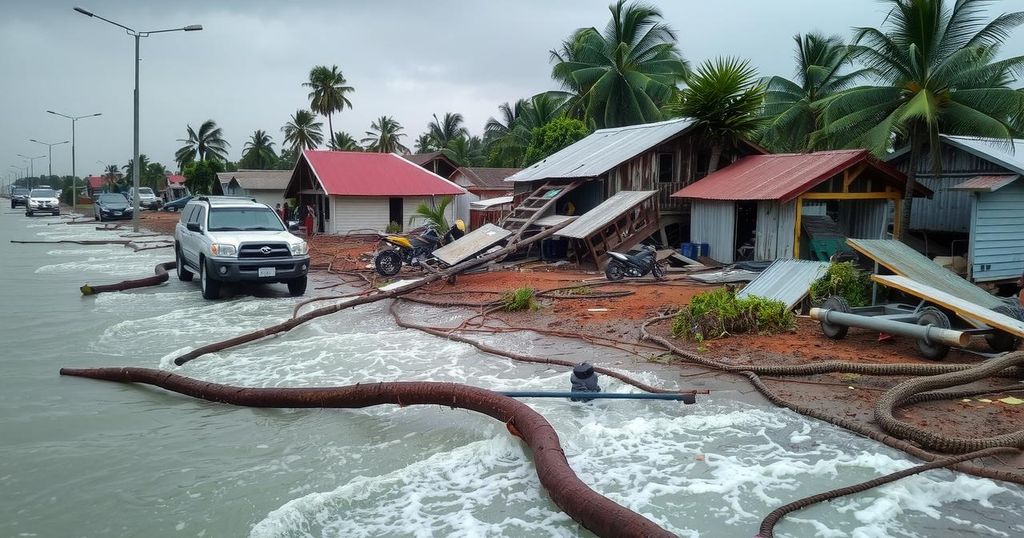Cyclone Chido Devastates Northern Mozambique, Displacing Thousands and Damaging Infrastructure
Tropical Cyclone Chido has devastated northern Mozambique, displacing thousands and destroying homes, infrastructure, and schools. The UN Refugee Agency (UNHCR) is providing emergency relief and protection services to vulnerable communities while assessing the overall damage. The cyclone’s impact is significant, with many already vulnerable families facing renewed hardships, highlighting the urgent need for humanitarian assistance.
Cyclone Chido has ravaged northern Mozambique, particularly affecting the provinces of Cabo Delgado and Nampula, as it unleashed torrential rains and intense winds over the weekend. Significant destruction ensued, leading to the displacement of thousands, destruction of homes, and damage to critical infrastructure such as roads and communication systems. In response to this humanitarian crisis, the UN Refugee Agency (UNHCR) is collaborating closely with the Government of Mozambique and various humanitarian partners to provide immediate relief and assistance to the affected population.
In the immediate aftermath of the cyclone, UNHCR mobilized resources by supplying emergency relief at Pemba, the capital of Cabo Delgado, catering to over 2,600 displaced individuals. Essential supplies including blankets, sleeping mats, mosquito nets, and emergency shelter materials were distributed. Furthermore, UNHCR is coordinating efforts to deliver vital protection services to the most vulnerable in the region, recognizing the compounded difficulties faced by communities already burdened by conflict and economic struggles.
Although the comprehensive impact of the cyclone on rural sectors remains under assessment, preliminary reports indicate that approximately 190,000 individuals are in urgent need of humanitarian assistance. The storm has also severely disrupted educational facilities with 33 schools damaged and nearly 10,000 homes destroyed. Many villages are left with barely any intact structures. Recent years of conflict and economic decline have exacerbated the vulnerabilities of these communities, and for those already displaced, Cyclone Chido has inflicted further hardship, dismantling the scant progress they had managed to achieve in rebuilding their lives.
Prior to the cyclone, UNHCR and its partners took preventative measures by pre-positioning emergency relief materials, facilitating the dissemination of disaster preparedness messages across the affected provinces, and collaborating with local disaster management teams to prioritize support for at-risk groups. In Nampula province, although certain districts experienced damage, the Maratane refugee camp housing over 8,000 refugees largely reported minimal impacts, attributed to recent initiatives on developing climate-resilient housing.
The cyclone also had devastating effects in Mayotte, resulting in fatalities and damage to infrastructure, severely impacting vulnerable communities including asylum-seekers and refugees. UNHCR is closely monitoring developments in this territory and coordinating with regional partners for effective responses. In southern Malawi, the storm led to similar destruction of homes and infrastructure, prompting UNHCR to pre-position essential shelter kits to assist in the coordinated Government-led recovery efforts.
UNHCR expresses concern that Cyclone Chido may herald the onset of a severe rainy season, historically associated with cyclones and flooding in the region. Displaced populations, already on the brink due to previous hardships, now confront heightened risks of further displacements and losses as climate challenges disproportionately affect the most vulnerable. UNHCR remains steadfast in its commitment to aiding the impacted communities across Mozambique and the broader region, albeit resource constraints pose a significant challenge to meeting the urgent needs of thousands who require immediate assistance.
Cyclone Chido’s onset in northern Mozambique highlights the region’s vulnerability to climate-related disasters, particularly during the rainy season, which historically exacerbates the risks of flooding and storm damage. The ongoing conflicts and economic hardships in the area have compounded the challenges faced by local communities, particularly those already displaced. Organizations like UNHCR play a pivotal role in providing humanitarian assistance to address both immediate needs and long-term recovery for affected populations.
In conclusion, Cyclone Chido has inflicted severe damage on Mozambique, displacing thousands and destroying vital infrastructure, exacerbating the hardships faced by vulnerable communities amidst ongoing conflicts and economic challenges. UNHCR’s proactive response, including the provision of emergency relief and protective services, is crucial in addressing the immediate humanitarian needs. However, the looming threat of further climate-induced challenges underscores the urgent need for sustained support and resource mobilization to ensure recovery and resilience for affected populations.
Original Source: www.unhcr.org




Post Comment